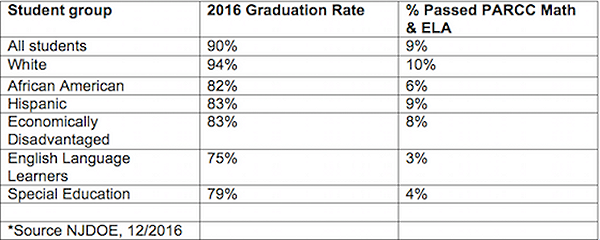NJ GRAD RATE RISES, BUT BIG PROBLEM LOOMS
The NJ Department of Education’s (NJDOE) 2016 graduation report contains good news: the high school graduation rate rose above 90% for the first time, and the rate increased for the fifth straight year since federal regulations in 2011 required a more uniform and reliable count.
Diploma rates increased for every student subgroup during that period, with the greatest gains made by African American, Hispanic and economically disadvantaged students.
NJ’s high school graduation rate is the second highest in the nation.
Although gaps remain, the 82.7% graduation rate for economically disadvantaged students is now slightly higher than the most recent national rate for all US students: 82.3% in 2014.
But the NJDOE report doesn’t mention that this progress will be undermined by rules recently adopted by the Department that make the new PARCC exams the state’s sole graduation test by 2021. The portfolio appeal will be the only alternative for graduation, and access to that will to limited to students who took and failed PARCC.
Only 9% of last year’s 96,000 graduating seniors passed PARCC exams in math and English Language Arts (ELA), the exams that will be the sole graduation tests for next year’s freshman class and beyond. The chart below shows the gap between the 2016 graduation rate for each student subgroup and the percentage that graduated by passing PARRC:

Almost 75,000 of last year’s seniors relied on options that will not be available by 2021:
- Nearly 50,000 seniors used “substitute” tests, such as the SAT or ACT, to satisfy the state testing requirement in both ELA and math;
- 6,000 students used “portfolio” appeals to meet both requirements;
- Another 26,000 seniors used substitute tests or portfolios to satisfy either the ELA or math requirement;
- African American, Hispanic, and economically disadvantaged students disproportionately relied on the portfolio option. While overall 6% of seniors used portfolios for both ELA and math, 15% of African American students, 14% of Hispanic students, and 13% of low-income students used this option, compared to just 2% of white students; and
- More than half of all English Language Learners needed portfolios to graduate
The NJDOE did not include this “pathway to graduation data” in their annual graduation report. The data was released in December under a settlement agreement between the NJDOE, Education Law Center (ELC) and the American Civil Liberties Union of New Jersey (ACLU-NJ). ELC and ACLU-NJ sued the Department last year for imposing the new graduation requirements without following state law.
The “pathways” data makes clear that NJDOE’s plan to rely only on PARCC as the state graduation test will have a huge negative impact on NJ’s graduation rates when it takes effect in 2021.
Under the NJDOE’s new rules, next year’s freshmen (the Class of 2021) must pass the PARCC English Language Arts 10 (ELA) and Algebra I exams to graduate. Passing rates on these tests were 37% and 36%, respectively, during their first year of administration, and 44% and 41% in the second year. Even if these rates improve over the next few years, thousands of students will be at risk of not graduating in 2021, and thousands more will need portfolios, a costly and time-consuming burden for students, schools and districts.
A new lawsuit challenging NJDOE’s graduation rules is pending in state appellate court. The lawsuit was filed by the Latino Action Network (LAN), the Latino Coalition of New Jersey (LCNJ), the Paterson Education Fund (PEF), the NAACP-NJ, and ELC.
“We’re pleased New Jersey continues to be a national leader in graduation rates,” said Stan Karp, ELC’s Director of Secondary Reform. “But behind the 2016 data is another story that the Department doesn’t want to tell. If the new graduation rules are not changed, we’ll see significant numbers of students at risk of not graduating in a few short years.”
“We also call on the Department to release not just the overall graduation rates, but to continue to release the all-important pathway data on which alternative test or the portfolio process seniors are using to obtain a diploma,” Mr. Karp added. “This data is crucial to the ongoing debate over the Department’s push to limit the state graduation test to the PARCC exams by 2021.”
Related Stories:
NEW DATA SHOWS NEED TO REVISE NJDOE GRADUATION POLICIES
NJDOE’S PROPOSED GRADUATION RULES VIOLATE NJ’S GRADUATION STATUTE
Press Contact:
Sharon Krengel
Policy and Outreach Director
skrengel@edlawcenter.org
973-624-1815, x 24
Press Contact:
Sharon Krengel
Director of Policy, Strategic Partnerships and Communications
skrengel@edlawcenter.org
973-624-1815, x240